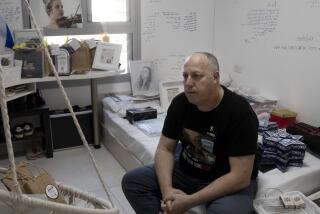Are Hostage Families Right to Go Visit Iraq? : It’s a matter of compassion, though it does affect U.S. policy
- Share via
The somewhat ghoulish invitation of President Saddam Hussein to “come visit Iraq,” as it were, presents the loved ones of hostages being held there with a difficult dilemma. It’s not surprising that some of them are reacting emotionally. It’s also not surprising that some plan to go.
The invitation of the Iraqi President for hostage families to travel to Baghdad for the holidays and see their loved ones was extended not wholly out of humanitarian fervor. Clearly, the Iraqis hope to milk these visits for all the propaganda value they are worth. Hussein seems to think the world will see Iraq as a kinder, gentler place--and as a country with which it is possible to do business. It probably doesn’t occur to Hussein that these visits, as well as his latest offer to free all “guests” by March, only remind everyone of Iraq’s cruel hostage-taking policy.
For its part, the State Department advises hostage families that Hussein’s offer is one they should refuse. It feels that the situation there is dangerous and unpredictable, that there is no guarantee that once inside the country the visiting relatives of hostages will be permitted to leave, and that the whole exercise is mere grist for Baghdad’s propaganda mill. What is unspoken, of course, is the additional worry that hostilities between Iraq and the U.N. forces will erupt at the very time that some hostage families are visiting there.
Nevertheless, the American government, to its credit, says it has no plans to enforce the federal Logan Act. This is a general prohibition barring private citizens from interfering in foreign policy. The Bush Administration, strictly speaking, could take the position that accepting the invitation plays into an enemy’s hands and works against the conduct of American policy. In addition, the U.S. government has many ways to prevent these trips from taking place. At the moment there seems no sentiment for doing that. That’s good.
It could be that the sight of loved ones in Baghdad for the holidays will actually aid U.S. policy by starching up the anti-Hussein coalition and reminding people of the grisly nature of his dictatorship, its insensitivity to basic rules of normal human conduct and its propensity for maniacal, if clodhopper-ish, manipulation. But even if the visits have an effect close to what Saddam Hussein probably wants, it is still right that they be permitted to occur. In Western political philosophy, individuals do count; the role and desires of just one person have importance.
This terrible international crisis, even without war, has already claimed a horrible toll. It has destroyed an entire country, Kuwait, perhaps beyond repair. Now it is tearing families asunder. Hostage visits over the holidays will serve to alleviate the anguish somewhat, but also to vividly illustrate it.
More and more Americans are wary about a U.S. military campaign to roll back the Iraqi aggression in Kuwait. They just are not sold on the need for war. Peace is an idea with considerable appeal, especially during the Judeo-Christian holidays. The hearts of all Americans go out to the relatives of Hussein’s hostages as they look to recapture a moment of peace, and love, in their own crisis-torn lives.
WHO’S THERE NOW
Western citizens still in Iraq and Kuwait:
Britain: 1,500 United States: 700 Germany: 413 Italy: 306 Ireland: 254 Netherlands: 169 Canada: 100 Australia: 94 Sweden: 90+ Switzerland: 80 Denmark: 70
More to Read
Sign up for Essential California
The most important California stories and recommendations in your inbox every morning.
You may occasionally receive promotional content from the Los Angeles Times.













